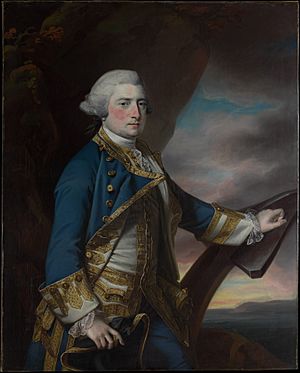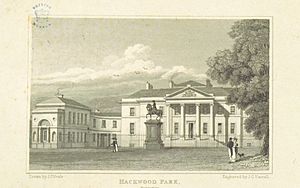Harry Powlett, 6th Duke of Bolton facts for kids
Quick facts for kids
The Duke of Bolton
|
|
|---|---|

Portrait by Francis Cotes
|
|
| Nickname(s) | Admiral Stern-post |
| Born | 6 November 1720 |
| Died | 25 December 1794 Hackwood House |
| Years of service | 1733–1794 |
| Rank | Admiral |
| Commands held | HMS Port Mahon HMS Oxford HMS Sandwich HMS Ruby HMS Exeter HMS Somerset HMS Barfleur |
| Battles/wars | |
| Alma mater | Winchester College Royal Naval Academy |
| Relations | Harry Powlett, 4th Duke of Bolton (father) Catherine Parry (mother) |
Harry Powlett (born November 6, 1720 – died December 25, 1794) was a British nobleman and a high-ranking officer in the Royal Navy. He became the 6th Duke of Bolton. He was also a member of the Privy Council.
Contents
Early Life and Family
Harry Powlett was born on November 6, 1720. He was the second son of Harry Powlett, the 4th Duke of Bolton, and his mother was Catherine Parry.
He attended Winchester College from 1728 to 1729. Later, he joined the Royal Navy.
Harry Powlett began his naval career in 1733. On March 4, 1740, he was promoted to lieutenant aboard HMS Shrewsbury. Just a few months later, on July 15, 1740, he became a captain of HMS Port Mahon. In July 1741, he moved to command HMS Oxford.
Battle of Toulon
While commanding Oxford, Captain Powlett took part in the Battle of Toulon in 1744. This was a major naval battle during the War of the Austrian Succession. After the battle, he provided important information against another officer, Richard Lestock.
Capturing French Ships
In March 1745, he was moved to HMS Sandwich, and soon after to HMS Ruby. On April 11, 1746, Ruby, along with two other ships, was sent to join the fleet off Brest, France. Before meeting the main fleet, Captain Powlett successfully captured a French warship called Embuscade.
He was given command of HMS Exeter in November 1746. He then sailed to the East Indies to serve under other admirals. In 1748, he helped with the Siege of Pondicherry. His job was to measure the depth of the water near Pondicherry to help arrange the naval blockade of the town.
Court-Martials and Duels
When he returned to England in April 1750, Captain Powlett made a serious accusation against Rear-Admiral Thomas Griffin. He claimed Griffin had failed to attack eight French ships at Cuddalore. This decision had been unpopular among Griffin's captains. Griffin was found to have been careless and was temporarily suspended from his rank.
In response, Griffin brought his own accusations against Powlett, including cowardice. Powlett tried to avoid an official investigation by taking a break from duty. During this time, he also became a Member of Parliament for Christchurch in 1751.
Despite his efforts, Powlett faced an official investigation on September 1, 1752. However, he was found innocent because Griffin's accusations lacked enough proof. This incident caused a lot of public discussion. It ended in 1756 with a personal confrontation between the two officers at Blackheath.
Political Connections and Nickname
Captain Powlett's quick promotions and his willingness to challenge higher-ranking officers were partly due to his family's influence. His father had been a powerful figure in the government. This helped ensure Harry's continued rise in the navy.
In 1754, after his father became Duke, Harry Powlett became known as Lord Harry Powlett. He also became a Member of Parliament for Lymington.
In 1755, while serving with Admiral Hawke's fleet, his ship, HMS Barfleur, had a problem. The ship's carpenter reported that the sternpost (a main timber at the back of the ship) was dangerously loose. Powlett returned to port for repairs. He later faced an official investigation for leaving the fleet without good reason. He was cleared of some charges, but the carpenter was dismissed. Many believed the carpenter was unfairly blamed. After this, Powlett was often called "Captain Stern-Post."
Despite these incidents, his family's influence remained strong. He was promoted to rear admiral on June 4, 1756, and vice admiral on February 14, 1758. Even with these promotions, he never received another naval command. It was said that King George II had a low opinion of him. In 1761, he changed his political seat and became an MP for Winchester.
Becoming Duke of Bolton
In 1765, Harry Powlett's elder brother, Charles, the 5th Duke of Bolton, passed away. Since Charles had no children, Harry Powlett became the 6th Duke of Bolton.
As a Duke, he continued his political involvement. He was sworn into the Privy Council on December 10, 1766. In 1767, he was given the honorary role of Vice-Admiral of Dorset and Vice-Admiral of Hampshire. He continued to rise in naval rank, becoming Admiral of the Blue on October 18, 1770, and Admiral of the White on March 31, 1775.
In 1778, he disagreed with the government's handling of the American War of Independence. His political activity lessened after 1780. However, in 1782, he was appointed Governor of the Isle of Wight and Lord Lieutenant of Hampshire.
Family Life
Harry Powlett, 6th Duke of Bolton, was married twice.
First Marriage
On May 7, 1752, he married Mary Nunn (who passed away in 1764). They had one daughter:
- Lady Maria Henrietta Powlett (died March 30, 1779), who married John Montagu, 5th Earl of Sandwich.
Second Marriage
On April 8, 1765, he married Katherine Lowther (who passed away on March 21, 1809). She was the daughter of Robert Lowther. They had two daughters:
- Lady Amelia Powlett, who never married.
- Lady Catharine Margaret Powlett (1766 – June 17, 1807), who married William Vane, 1st Duke of Cleveland.
Death and Legacy
The 6th Duke of Bolton passed away on December 25, 1794, at Hackwood Park in Winslade, Hampshire. He was buried in Basing, Hampshire, and a monument was created for him by the sculptor John Flaxman.
Because he had no sons, the title of Duke of Bolton ended with his death. His distant cousin, George Paulet, inherited the title of Marquess of Winchester. The family's estates, including Bolton Hall, Bolton Castle, and Hackwood Park, went to his brother's natural daughter, Jean Browne-Powlett. She was married to Thomas Orde, who later added Powlett to his name.
Images for kids
 | Janet Taylor Pickett |
 | Synthia Saint James |
 | Howardena Pindell |
 | Faith Ringgold |




